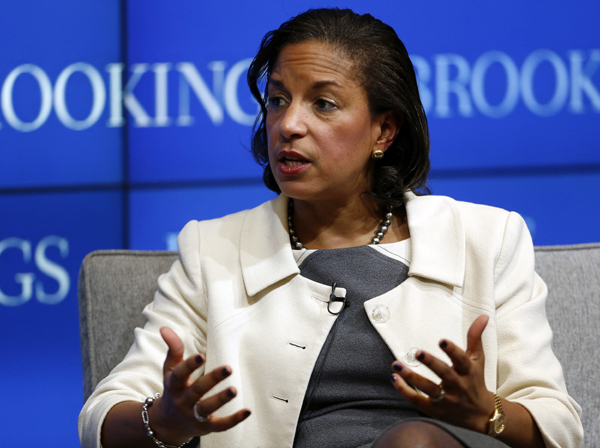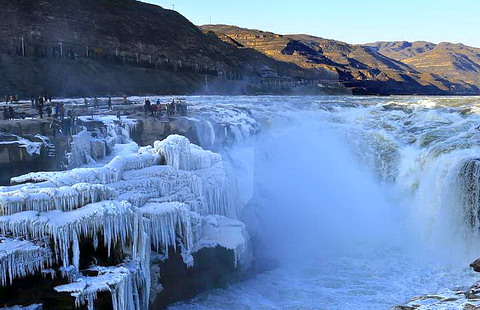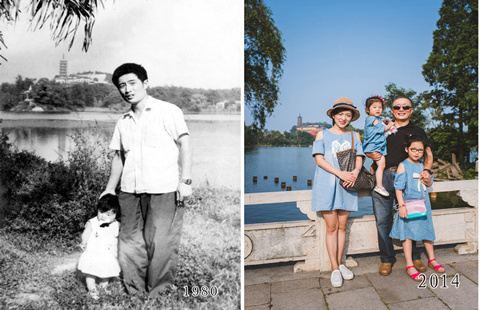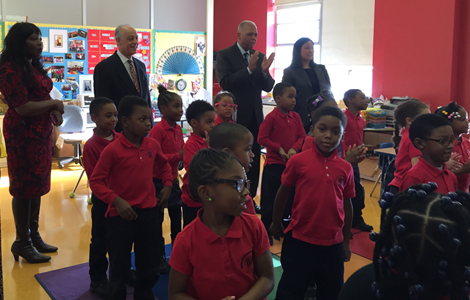Rice: US invites Xi for state visit
Updated: 2015-02-07 15:12
By CHEN WEIHUA in New York(chinadaily.com.cn)
|
||||||||
 |
|
United States National Security Advisor Susan Rice answers questions after her speech at the Brookings Institution in Washington, Feb 6, 2015. [Photo/Agencies] |
The United States government has invited Chinese President Xi Jinping for a state visit this year, US National Security Advisor Susan Rice said on Friday.
Talks about such a visit by Xi to the US this year has been circulated for some time as Xi is also expected to visit the United Nations in New York City in September for the 70th anniversary of the founding of the international body.
If Xi makes his trip to the US in September, it will be his third visit to the US in the last three and half years. He last visited the US in June 2013 with the historical shirt-sleeves summit with Obama at the Sunnylands retreats in Rancho Mirage, California. He also visited the US in February, 2012 as China’s vice-president, meeting both Obama and Vice-President Joe Biden and toured Muscatine, Iowa, a small town where Xi first visited in 1985 as a county chief of North China’s Hebei province.
“With China, we’re building a constructive relationship that expands practical cooperation across a wide spectrum of issues from global health to non-proliferation, even as we confront real differences over human rights, cyber-enabled economic espionage, and the use of coercion to advance territorial claims,” Rice said on Friday in a talk on US national security strategy held at the Brookings Institution, where she was a senior fellow before joining the Obama administration. Her mother Lois Dickson Fitt is a scholar of economics at the Brookings.
The 2015 White House National Security Strategy unveiled on Friday said “the scope of our cooperation with China is unprecedented, even as we remain alert to China’s military modernization and reject any role for intimidation in resolving territorial disputes.”
The US’ military spending is almost four times China’s. Many Chinese regard US as bias in its words and deeds regarding maritime territorial disputes in South and East China seas, especially when it involves US treaty allies.
Rice touted the US leadership by citing its efforts in dealing with the threat of the climate change. She said the US is making smart decisions today that will pay off for generations, adding that the ground-breaking climate commitment with China will limit both nations’ greenhouse gases and bend down the global emissions curve.
Obama paid a landmark visit to China last November, when he and Xi reached a long list of bilateral cooperation agreements, including on climate change, military confidence building and reciprocal extended visa program.
Rice also said the US is taking leadership role in addressing the pressing need for enhanced cyber-security. “As more of the world comes online, we’re leading an international effort to define the rules for how states engage with one another in cyberspace, while ensuring the Internet remains a powerful tool to drive future advances,” she said.
Many nations, including some US allies, remain deeply suspicious of US behavior in cyberspace, following the revelations made by former National Security Agency (NSA) contractor Edward Snowden in mid 2013 that NSA had conducted large scale of surveillance of foreign leaders, foreign corporations and international organizations.
China has suspended a bilateral working group on cybersecurity after US Justice Department indicted five People’s Liberation Army officers last May for alleged cyber theft, a move described by many experts in China and the US as unwise in tackling the thorny issue between the two countries.
Rice also said that the US will start with the Asia-Pacific in its efforts to update the existing international system. “Our rebalance is deepening longstanding alliances and forging new partnerships to expand cooperation. We’re investing in ASEAN, the East Asia Summit, and the Pacific Islands Forum to strengthen their capacity to enforce regional norms, respond to crises like natural disasters, and resolve disputes peacefully, so that the Asia Pacific remains a region of dynamic growth and opportunity,” she said.
Many people in China have remained suspicious of the US rebalance strategy, describing it as a US geopolitical effort to curtail China’s rapid rise in the region, where China has become the largest trading partner for most of the nations.
Rice said the US-China relations as “one of our defining relationships for the 21st century”, describing it as “complex, one of both cooperation and completion, but it’s very much a part of how we view the world.”
While calling Obama’s recent trip to India as a success, Rice dismissed the saying that US relationship with India and China is to pit one against the other.
Cheng Li, director of the John L. Thornton China Center at the Brookings, told China Daily earlier that Xi and Obama should hold high-level summit every year.
He said it’s worth applauding that despite so many problems in 2014, the two nations' top leaders have still managed to bring relations back on the right track, referring to the Xi-Obama meeting in November.
While Xi is on the guest list this year, Rice said other Asian leaders, such as Japanese Prime Minister Shinzo Abe, South Korea President Park Geun-hye, and Indonesian President Joko Widodo, are also expected to visit the US this year.
chenweihua@chinadailyusa.comMost Viewed
Editor's Picks

|

|

|

|

|

|
Today's Top News
Search continues for 3 missing in TransAsia crash
Three more H7N9 cases reported in China's Guangdong
US invites Xi for state visit
US issues unemployment figures for Asian-Americans
Beijing district to ease residency permits for migrants
Deputy consul gets official sendoff
Chinese Americans growing as spenders
Tax, tech rules 'test' US-China relations
US Weekly

|

|















